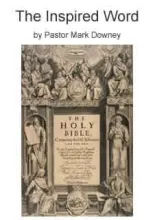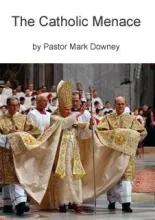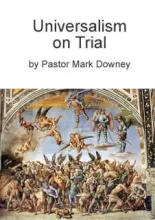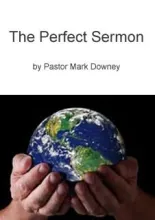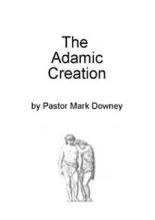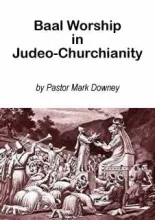A Study on Philip and the Ethiopian Eunuch
by Pastor Mark Downey
" ... the story about Philip and the Ethiopian found in Acts 8:26-40. It has been assumed by contemporary seminary trained doctors of divinity that the Ethiopian of 2000 years ago is the same as today, as if to say the demographics remained static. We in Christian Identity respectfully disagree.
The key to the identity of the Ethiopian eunuch is to find out who the inhabitants of Ethiopia in New Testament times really were. Many Judeo-Christian publishers gloss the Ethiopian as an arbitrary African Negro without much historical accuracy. History is replete with examples of territories changing in racial make-up via wars, famines, migrations etc. Egypt is a good example of determining the racial identity of an Egyptian, depending on the time period. The history of Ethiopia is one of several important kingdoms that are basically unknown to Christendom, e.g., the Silurian Parthian and Scythian Empires. These territories provided fertile soil for the missionary efforts of the early Christian church. The Apostle Matthew spent much of his time fulfilling the Great Commission in the most unknown Christian empire of them all: Aksum, ancient Ethiopia.
This is what the World Book Encyclopedia has to say about this empire: “Aksum was a powerful ancient kingdom in East Africa. It was the ancestor of Ethiopia. It became important about 50 A.D. and reached its zenith between the 300s and 600s. Aksum grew rich and powerful because of Adule, its port on the Red Sea. Adule was a world trading center. Goods were traded to merchants from Egypt, Greece, Rome, Persia, India and Ceylon. Aksumite kings built impressive forts, palaces and granite monuments. During the 300s, King Ezana defeated the state of Meroe. Ezana became famous for making Christianity the state religion. Aksum declined after the Persians conquered Arabia in the late 500s. During the 600s, the Muslims conquered the Persians and stopped the flow of settlers who had come to Aksum from southern Arabia. As a result, the Christians of Aksum were surrounded by non-Christians.”
In 960 A.D. Judith (a descendent of Cain), conceived a plan to murder all members of the royal family of Aksum (descendants from King Solomon of Israel and the Queen of Sheba of southern Arabia). During and after this reign of terror, this once powerful Christian kingdom fell into insignificance. Later, in the 1600s Negro tribes called Galla moved into the ancient land and ravaged, pillaged, and burnt enormous areas, destroying countless treasures contained in the churches and irreplaceable old manuscripts. Thus, once the second largest Christian nation of its time, Aksum became a wasteland, and its heritage forgotten and ignored. The forgotten history of the kingdom of the African Nile has caused many modern day Christian Bible students to make a major assumption that is totally incorrect: that the Ethiopian eunuch of Acts chapter 8 was a Negro. But this popular assumption is not correct for the following reasons:
- It’s a faulty assumption because it’s based on the idea that Ethiopia now, as well as 2000 years ago, was and is a Negro nation. All of the ancient kingdoms of East Africa, including Egypt, Aksum, Kush, Yemen and southern Arabia were not Negro nations in 33 A.D., but instead were Caucasian and bastions of white culture until the 1600s.
- The word “Ethiopian” indicates that this eunuch was a Caucasian. “Aith” means sunburned and “ops” means countenance, hence a sunburned complexion. Negroes do not have a sunburned look. It is white people who tan from sun exposure and therefore were the original Ethiopians according to archaic etymology. A similar exegesis is found in the Song of Solomon.
- The Ethiopian eunuch had been to Jerusalem to do what only an Israelite could do, i.e. “to worship” (Acts 8:27). Who was allowed to worship in the Temple? Could a non-Israelite enter the Court of Israel and worship in the Temple, especially in the time right after the death of Christ? Consider what happened to the Apostle Paul when he stirred up all the people by bringing Greeks into the Temple, and they were going to kill him for it (Acts 21:27-31). Trophimus, even though he was racially the same as Paul, was considered a heathen, polluting the Temple by his presence. How then could an Ethiopian Negro (who definitely could not be an Israelite) have entered into the forbidden, exclusive Temple Court of Israel and worshipped? Wouldn’t he have polluted the Temple too?
- The Ethiopian was reading a very expensive scroll of Isaiah. Phillip asked him if he knew what he was reading, and he said he needed someone to explain. The eunuch had just finished reading the following 3 verses from Isaiah 53:4-6, which had the recurrent theme of “OUR griefs”, “OUR sorrows”, “OUR transgressions”, “OUR iniquities”, “OUR peace”, “WE are healed”, “WE, like sheep” and “WE have turned”. What people are all the preceding pronouns (in caps) referring to? “For the transgression of MY PEOPLE was He stricken” (Isaiah 53:8): God’s people; the people known as ‘sheep’; the people whom Christ redeemed; the people of the covenants; the people of God’s Kingdom; the people next of kin to Christ, their Kinsman Redeemer, the God of Israel. Isaiah was writing about providing atonement for Israel. This is, no doubt, what Philip explained to the Ethiopian eunuch. The Apostle Phillip, Isaiah, Christ and the Ethiopian (Aksumian) eunuch were all Israelites.
- Doesn’t it seem strange that if Aksum, the second largest Christian nation at one time, was actually a black nation, that there was no other known black Christians, let alone kingdoms, anyplace in the world? Isn’t it significant that there were no Negroes who ever attended any of the church councils; or were bishops or elders from this or any other area? If any assumptions are to be made, it is fair to think that the eunuch probably helped Matthew to establish churches in an area with a rich Christian heritage (which is all but forgotten today).
The preceding study is a typical treatment of rightly dividing the Word of God and harmonizing it with the rest of scriptures from a Christian Identity perspective. We cannot ignore secular history as it relates to His Story of divine revelation. Christian Identity is an aspiration towards pure Christianity in all of its moral applications. We admonish our people to read, believe and obey the Word of God. Much of the biblical narrative is enhanced by the understanding and wisdom we get from knowledge that is freely available."
- Log in to post comments

 "For thou art an holy people unto the Lord thy God: the Lord thy God hath chosen thee to be a special people unto himself, above all people that are upon the face of the earth."Deuteronomy 7:6
"For thou art an holy people unto the Lord thy God: the Lord thy God hath chosen thee to be a special people unto himself, above all people that are upon the face of the earth."Deuteronomy 7:6
